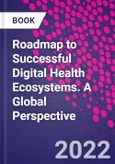Roadmap to Successful Digital Health Ecosystems: A Global Perspective presents evidence-based solutions found on adopting open platforms, standard information models, technology neutral data repositories, and computable clinical data and knowledge (ontologies, terminologies, content models, process models, and guidelines), resulting in improved patient, organizational, and global health outcomes. The book helps engaging countries and stakeholders take action and commit to a digital health strategy, create a global environment and processes that will facilitate and induce collaboration, develop processes for monitoring and evaluating national digital health strategies, and enable learnings to be shared in support of WHO's global strategy for digital health.
The book explains different perspectives and local environments for digital health implementation, including data/information and technology governance, secondary data use, need for effective data interpretation, costly adverse events, models of care, HR management, workforce planning, system connectivity, data sharing and linking, small and big data, change management, and future vision. All proposed solutions are based on real-world scientific, social, and political evidence.
Please Note: This is an On Demand product, delivery may take up to 11 working days after payment has been received.
Table of Contents
1. Transforming health care2. Global and national infrastructures supporting digital health ecosystems3. Global collaborative leadership challenges and economic drivers4. Fragmented global standards development organisations5. Standards for digital health, known limitations, and procurement6. The knowledge-driven platform: Strategic technologies for a platform ecosystem approach7. Are professional guidelines and regulatory standards fit for purpose?8. Health data standards' limitations9. Quality data, design, implementation, and governance10. Guideline and knowledge management in a digital world11. Modelling clinical knowledge12. Identity-What is in a name?13. Electronic health records and essential technology paradigms14. Health data security and privacy challenges: Solutions for the future15. The digital needs of genomics resulting from pandemics16. Health informatics in the Middle East and North Africa17. A framework for regional health information systems interoperability: Asia eHealth information network experiences18. The road to interoperability: openEHR modelling and implementation19. Evidence-based biomedical information systems: The road ahead20. Norway, Sweden, and Finland as forerunners in open ecosystems and openEHR21. The Brazilian digital health system: Building the digital transformation to engage country citizens22. Benefits of using SNOMED CT in the UK National Health Service (NHS)23. Primary health reform for the digital era24. Caribbean/PAHO-Jamaican case study25. Addressing workforce knowledge gaps in digital health26. Emerging digital health ecosystemsAuthors
Evelyn Hovenga CEO and Director, eHealth Education Pty Ltd, East Melbourne, VIC, Australia. Evelyn Hovenga, RN, PhD, FACS, FANC, FIAHSI, currently manages eHealth Education, an RTO, and the not-for-profit Global eHealth Collaborative (GeHCo) and continues to work as a digital health consultant. She retired as Professor of Health Informatics in 2007, following a 25-year career in this discipline with a focus on standards development as these apply to EHRs, semantic interoperability, and terminology and is Honorary Senior Research Associate at the Centre for Health Informatics and Multiprofessional Education, University College London (http://www.chime.ucl.ac.uk/). Evelyn started her career as a registered nurse; has health executive, public service, educational and research experience; obtained a PhD in Health Administration (Nursing Informatics); initiated and hosted the first National Health Informatics Conference (HIC) in Melbourne in 1993; is one of the founders of HISA and the Australasian College of Health Informatics; and is a founding fellow of the International Academy of Health Sciences Informatics (FIAHSI), Geneva. She is also widely published. Evelyn is an honorary member of the International Medical Informatics Association's Nursing Informatics SIG as a result of representing Australian nurses from 1984 for many years, as a member and Past Chair of this group. Heather Grain School of Public Health, La Trobe University, Bundoora, VIC, Australia.Heather Grain, ADip HIM, Dip TDD, GDip IS, MHI, FAIDH, FMU, FIAHSI, possesses international expertise in developing, implementing, and managing digital health systems and data governance. A leader in electronic health record systems, she has worked across multiple countries and held significant roles in health informatics at organizations such as ISO, HL7, and SNOMED International. Currently, she leads the Information Governance Ad Hoc Group for ISO TC215.
As an educator, Heather has guided many into health informatics, developing courses for eHealth Education and several universities. She designed the Electronic Health Records Online Learning (eHRoL) clinical coding simulation and training tool for the Global eHealth Collaborative (GeHCo). With a strong understanding of both the practical and theoretical aspects of digital health, she emphasizes the importance of data harmonization to reduce costs and improve healthcare outcomes, while working to advance skills and education strategies in digitally supported healthcare.








